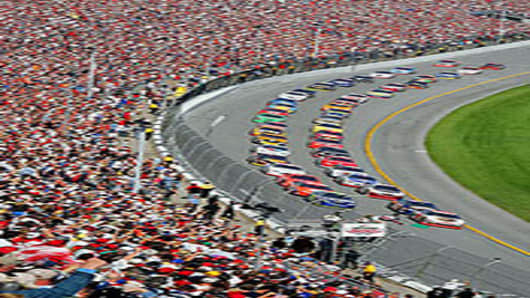With 48 laps, or 120 miles to go, in the sport's biggest race, NASCAR officials decided to call off the Daytona 500 on Sunday and declare Matt Kenseth the winner.
Matt Kenseth, you know, the guy who led for a single green flag lap. The guy who came out of his car and called this a "G" moment. (What? When a game ends before it's supposed to? That's a "G" moment?)
To NASCAR fans in the stands, this wasn't blasphemy. There was no explanation needed. No interview with NASCAR president Mike Helton to explain the call. After all, it was only six years ago that Michael Waltrip won a rain-shortened Daytona 500. You might have heard of that race -- the Daytona 272?
Can you believe that not a single member of the media at the Daytona 500 questioned the authorities as to why the rules allow this to happen? I know this because I e-mailed with NASCAR's managing director of corporate communications, Ramsey Poston, who told me my line of questioning was the first time the idea of canceling the race was even talked about with a reporter.
While NASCAR fans might let this go, people who sample NASCAR won't. Even if something is deemed an official race, you can't declare a winner in your sport's biggest race because of weather. People who invest in a full a NASCAR race once a year for Daytona, don't want to see fireworks when there is still more racing to be done. Wanting to give the folks at NASCAR a fair shot, I felt I should ask Ramsey Poston a couple questions to make me better understand how this could happen.
Darren: Why did the race end like this?
Poston: The race was ended under caution because that was the understanding for which each of the drivers were competing -- each driver and most of our fans knew that there was "no tomorrow" and raced accordingly. This is why not a single car made a pit stop during the last caution. It was a strategic decision based on what they saw on the radar and the understanding of the long established rules.
Darren: Why is there no Monday at Daytona? What happened yesterday is the equivalent of two teams playing in the seventh game of the World Series. When one team takes the lead, for the first time and the game is official, the commissioner calls the game. That would never be accepted. They would wait and wait and if they had to the commissioner would invoke some "for the goodness of the game" power he would insist that a true winner is found. So my question is what are the logistics that don't allow the sport's biggest race to be naturally completed?
Poston: Yep. Good question. Funny, that not a single media member here in Daytona asked that question. I make that point because it's just an accepted part of the sport. Actually, your analogy is not quite right in NASCAR. In addition to the long established rule, NASCAR is so different from other sports in that our fans travel from long distances. In yesterday's case, we had close to 200,000 fans from around the country. We are very sensitive to the burden we would put on them to miss work, change their travel plans and take on additional expense. Furthermore, racing on Monday puts an extreme pressure on the teams -- with the next race in California, teams need to get back the Charlotte to pick up cars for that race, travel to California and prepare for that race.
Darren: In other sports when they do extend it another day, there is certainly the understanding that most of the fans won't be able to come back for the extension. That is why I'm not quite clear on that part. Does it have anything to do with cost associated with going another day?
Poston: The decision has nothing to do with costs. In fact, the industry would probably make more money by extending an additional day. This goes back to Bill France Sr., who always wanted the fans to know who the race winner was when they left the event -- a holdover from the first Daytona 500 in which is took three days to determine the winner (Lee Petty). The fact is that our fans travel on average 250 miles and we only race at most twice at any given track so it's important to cater to the fans as much as possible.
Ramsey cleared some things up for me, but I still can't see how calling their version of the Super Bowl is acceptable in any way. Maybe the idea of having the crowd see a winner during the first Daytona 500 was acceptable. But it's not acceptable anymore. When Lee Petty won in 1959, the crowd represented 100 percent of the people watching the race. Today, because of television, the crowd only represents about 1 percent of the total audience. The reasoning that it's not fair to keep the fans there doesn't hold water either. Like Game 5 of the World Series, which was postponed because of rain after it was official, some people are going to make it to the concluding part of the game, some people won't. As long as you honor the stubs, people understand that. And the California argument doesn't work either. For one, you could have started the race at 9 a.m. on Monday -- it was sunny in Daytona then -- and get the thing over quickly. NASCAR also isn't confined to that exact schedule. At some point you have to question the scheduling, given the fact that a race in California is right after Daytona. It's a convenient excuse that you have to get on your way, but it leaves you absolutely no wiggle room.
Questions? Comments? SportsBiz@cnbc.com



